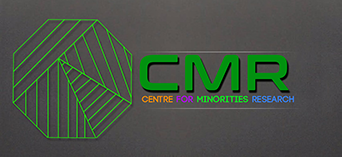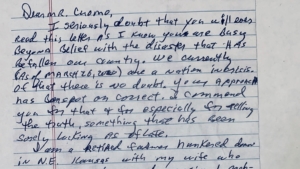By Sophia Rosenblatt
The press conference looked the same as it did every day. Andrew Cuomo—New York governor and emerging stud of the pandemic (see. Cuomosexual[1])— front and centre, framed on a TV screen which displayed “Breaking News” beneath him and death tolls by state to the right. These press conferences have been daily, broadcasted nationally and internationally, where he strikes the balance between delivering devastating statistics and reassuring Americans of their own inherent strength. Cuomo looked the perfect amount of exhausted but tough as he held up a piece of paper from the desk in front of him that day.
“I’m going to read this letter that I received that just sums it up”.
The letter, posted on Cuomo’s Instagram account a few days later, was from Dennis Ruhnke of northeast Kansas who had five N95 masks left over from his days as a farmer. Four of those masks he kept for his family. One, he sent to Cuomo.
The letter was one page long, cramped to the margins, and Cuomo read it by putting emphasis on Ruhnke’s description of his own situation, matter-of-factly reading the severity of the New York situation, and running quickly over the personal laudatories. At the end, Cuomo held up the N95 mask sent by the former farmer for the world to see.
“This is a snapshot of humanity”, he said, waving the mask as he spoke, its yellow cords shaking.
“How beautiful, how selfless”.
And it was a beautiful snapshot. A farmer from Kansas gifting a mask to Cuomo, intended for a New York doctor or nurse who was in need. But it is also through this gift of this mask, innocuous in origins but promoted symbolically by Cuomo, that we can observe the extent of the governor’s influence during this pandemic. The gift of the mask, as well as the performance surrounding it, shows how Cuomo’s narrative of New York has managed to elicit solidarity that transcends state borders. A solidarity which clearly defines two truth discourses in opposition to one another: Cuomo’s and the federal government’s.
While gift-giving can often be seen in anthropological studies as a maintenance of social relationships, the practice reads differently here. This gift brings up the idea of a “free gift”, one given without any real intention of reciprocity. Cuomo’s publicizing of the mask and its accompanying letter tacitly showcases how the altruistic intentions of a gift can be repurposed in the public eye. The purpose of the mask itself becomes abstracted from the giver’s original intention to have it sent on to a doctor or nurse, instead finding its place at a press conference to act as a physical piece of evidence. Through this, it becomes a tangible demonstration of the success of Cuomo’s discourse.
The selfless ‘unreturnability[2]’ of the mask is also called into question. In recent weeks since Cuomo has publicized the mask, Ruhnke has received his own share of publicity, culminating in him receiving his completed bachelor’s degree from his state in return for his kindness. Through this, the breadth of Cuomo’s influence is developed even further. This degree fulfilment by the state of Kansas exemplifies how the actual parameters of Cuomo’s governorship of New York and the power of his rhetoric show two separate modes of his influence. His power comes not only in the form of a strong hand in New York, but through non-New Yorkers who have felt the power of that influence through news and social media. This wide network of support, exemplifying the capillary effects of his truth discourse, allows Cuomo to indirectly return a supposedly unreturnable gift.
Most importantly, this gift of the mask underscores the complicated relationship between New York and the federal government. While Cuomo depicts this mask as highlighting a “snapshot of humanity” from an everyday citizen, he also subtly highlights the existence of the opposite: a long-winded lack of humanity displayed by the federal government. In the midst of Trump’s confusing rhetoric and conditional support to the states, Cuomo’s language and support is clear and concise.
The politicisation of this gift transforms its meaning. It becomes more than a gesture, but a promise of confidence in Cuomo’s abilities. An affirmation that, even in rural Kansas, his briefings can influence public belief in politicians.
“Take one mask, I’ll keep four,” Cuomo said, quoting directly from the letter, as he finished the press conference. He placed the mask on the table in front of him. “God bless America.”
[1] “Randy Rainbow is a ‘Cuomosexual’ in a Covid-19 love song to the New York Governor’. Huffington Post, 07 April 2020, https://www.huffingtonpost.co.uk/entry/randy-rainbow-coumosexual-covid-19-love-song-andrew-cuomo-andy_n_5e8ba672c5b6e1d10a687332?ri18n=true
[2] Pipyrou, Stavroula. 2014. Altruism and Sacrifice: Mafia Free Gift Giving in South Italy. Anthropological Forum, 24(4), 412–426.
A little about Sophia:
Sophia is a passionate cyclist and dancer from Queens, New York. She has recently completed her degree in Social Anthropology at the University of St Andrews, and hopes to pursue a career in human rights advocacy and non-profit work.

